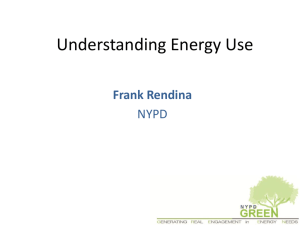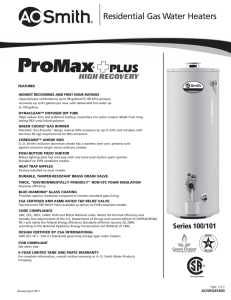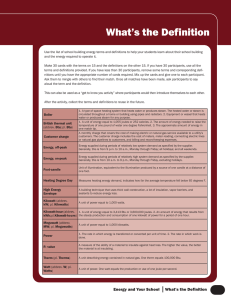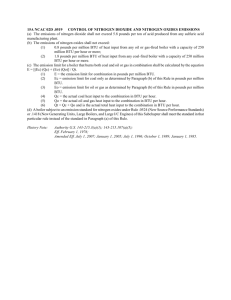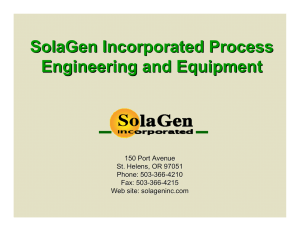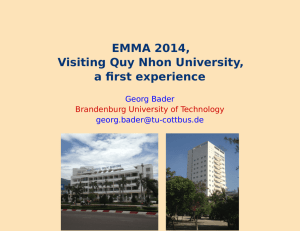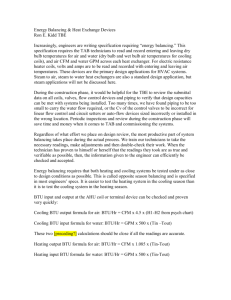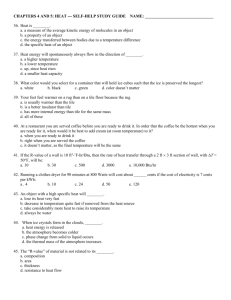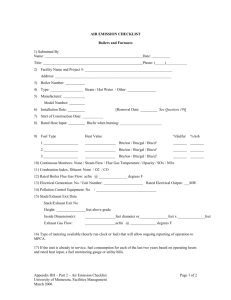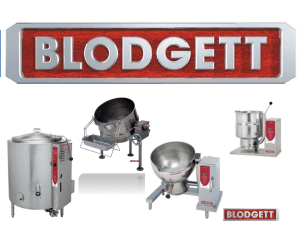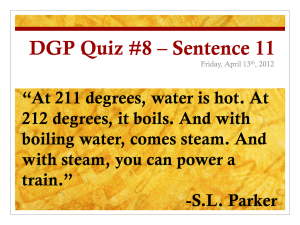PowerPoint - Asia-Pacific Partnership on Clean
advertisement
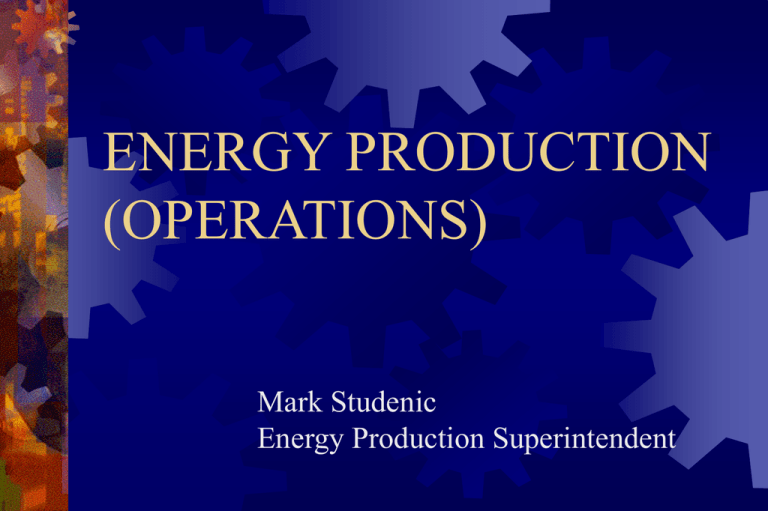
ENERGY PRODUCTION (OPERATIONS) Mark Studenic Energy Production Superintendent Operations – Maintenance Interaction Operations: • • • • Determines “what” and “when” for corrective maintenance Leads daily production meetings Initiates repair requests Performs minor maintenance Maintenance: • • Determines “who” and “how” Plans, schedules and executes maintenance work Preventive/predictive maintenance Most corrective maintenance Outage management 2 Operations - Staffing Four rotating shift teams Job Title Number/Team Total Energy Production Supervisor I 1 4 Energy Production Supervisor II 2 8 Unit Operator 6 24 Equipment Operator 8 32 Control Technician 1 4 Maintenance Mechanic 1 4 Trainer 1 Coordinator 1 Total 19 78 3 Operator Training & Development Simulator sessions Structured classroom training On the job training Written tests (monthly) • • Enhance system knowledge Coaching process Operating procedure reviews (monthly) Other • • Business plan (annual) New installations 4 Disciplined Approach Equipment Check Sheets Daily Weekly Monthly Quarterly Annual Start-up/Shut down Outage Performance Measures Commercial Availability Dispatch Accuracy Communications Heat Rate NOx Reduction Performance Environmental Performance Safety Performance Knowledge Tests 5 Performance Optimization Tools PI (Process Information) • • Trends Scorecards Operating procedures Alarms/Annunciators Personnel development processes 6 C Team On Duty 626 MWG.IPW 10/11/2006 12:14:18 PM Muskingum River Unit 5 Operator Controllable Costs Market Price $41.40 /MW Actual Target Design PSIG 3,598 3,600 3,500 -20 50 -$13.09 -$0 Main Steam Temperature F 1,006 1,000 1,000 -20 50 -$21.06 -$9 1st RH Steam Temperature F 1,026 1,025 1,025 -20 50 -$7.22 -$6 2nd RH Steam Temperature F 1,019 1,035 1,050 -20 50 $98.66 $31 1st RH Attemperation klb/hr 170 140 12 -20 50 $69.98 $37 2nd RH Attem peration klb/hr 0 0 1 -20 50 $0.25 $0 Excess Air % 16.4 18.0 18.0 -20 50 -$43.77 -$17 Exit Gas Temperature F 319 336 302 -20 50 -$288.20 -$111 Steam Coil Air Heaters klb/hr 25 0 0 -20 50 $198.84 $58 Condensers in. of HG 2.57 2.49 2.34 -20 50 $173.22 $59 HP Feedw ater Heaters Btu/Kwh -3 0 0 -20 50 -$22.53 -$13 LP Feedw ater Heaters Btu/Kwh 16 0 0 $116.30 $40 Auxiliary Pow er Mw 26.0 26.5 23.4 -$64.39 -$28 $196.99 $41 Units Controllable Cost Main Steam Pressure Circ. Water Temp. Unit Summary 626 Mw 600 Mw ON 84.3 DEG F -20 Feedw ater Flow 3,826 -20 50 50 klb/hr Calculated Heat Rate 9347 Btu/Kw h Fuel Flow 433 klb/hr Air FlowOver Rangeklb/hr Design Heat Rate Target Heat Rate 8989 Btu/Kw h 9356 Btu/Kw h Air/Fuel RatioCalc Failed Guidance Boiler Schematic Burner Tip Temps Full Load Readings Cost ($/Shift) 50 -20 Total Operator Contollable Cost Instant Gross Load Instant Net Load Load Control (AGC) Deviation from Target (Btu/Kwh) Target Deviation 9 Btu/Kw h Opacity SO3 Exit Gas Minimum NOx Emission Rate Turb/Cond Schematic FW Heaters Schematic Air Heater Schematic Tube Temp Profiles Unit 5 NOx Trends CEMS Shift Total $ 3.8 % 2.64 lb/Mbtu 302 DEG F 0.61 lb/Mbtu Sootblow er Trends Business Summary Operations - Challenges Aging workforce – loss of knowledge Aging plant – increased system failures (cables, piping, etc.) Training – new hires, new processes, new technology Environmental performance optimization Raising standards for excellence • • Disciplined approach (check sheets) Scorecards Cycling units (units 1-4) 8 Material Handling (Coal Yard) Highlights: • • • Burn approximately 2.72 million tonne/year (3 million tons/year) All coal received by train Rapid discharge rail car unloader Coal cost $/tonne ($/ton) Sulphur Kg/Million Kcal (lbs/MMBtu) Units 1-4 $31 - $41 ($35 - $45) 6.3 – 10.8 (3.5 - 6.0) Unit 5 $36 - $45 ($40 - $50) 2.9 – 6.3 (1.6 - 3.5) 9 Rail Car Unloader One of a kind in AEP System; 1995 Completely automated Unloads train at 3,356 tonnes per hour (3,700 tons per hour) Train moves continuously at 0.48 Km/hour (0.3 MPH) Equipped with top mount traveling rail car shaker 10 Ash Utilization Flyash- No commercial use Unit 5 Bottom Ash • • Units 1-4 Boiler Slag • • • No commercial use Used internally for dam construction and fill material 79% is processed and sold for roof shingles and sand blasting agent 19% is sold to local townships for roadway ice control 2% is stored on site as waste product Cenospheres 11 Chemical Lab Highlights • • • • • • Oxygenated feedwater treatment- unit 5 Reverse Osmosis System- unit 5 Circulating water copper corrosion inhibitor- unit 5 Cycle water sample conditioning system Caustic feedwater treatment- units 1-4 On-line cycle water instrumentation 12 Questions? 13
